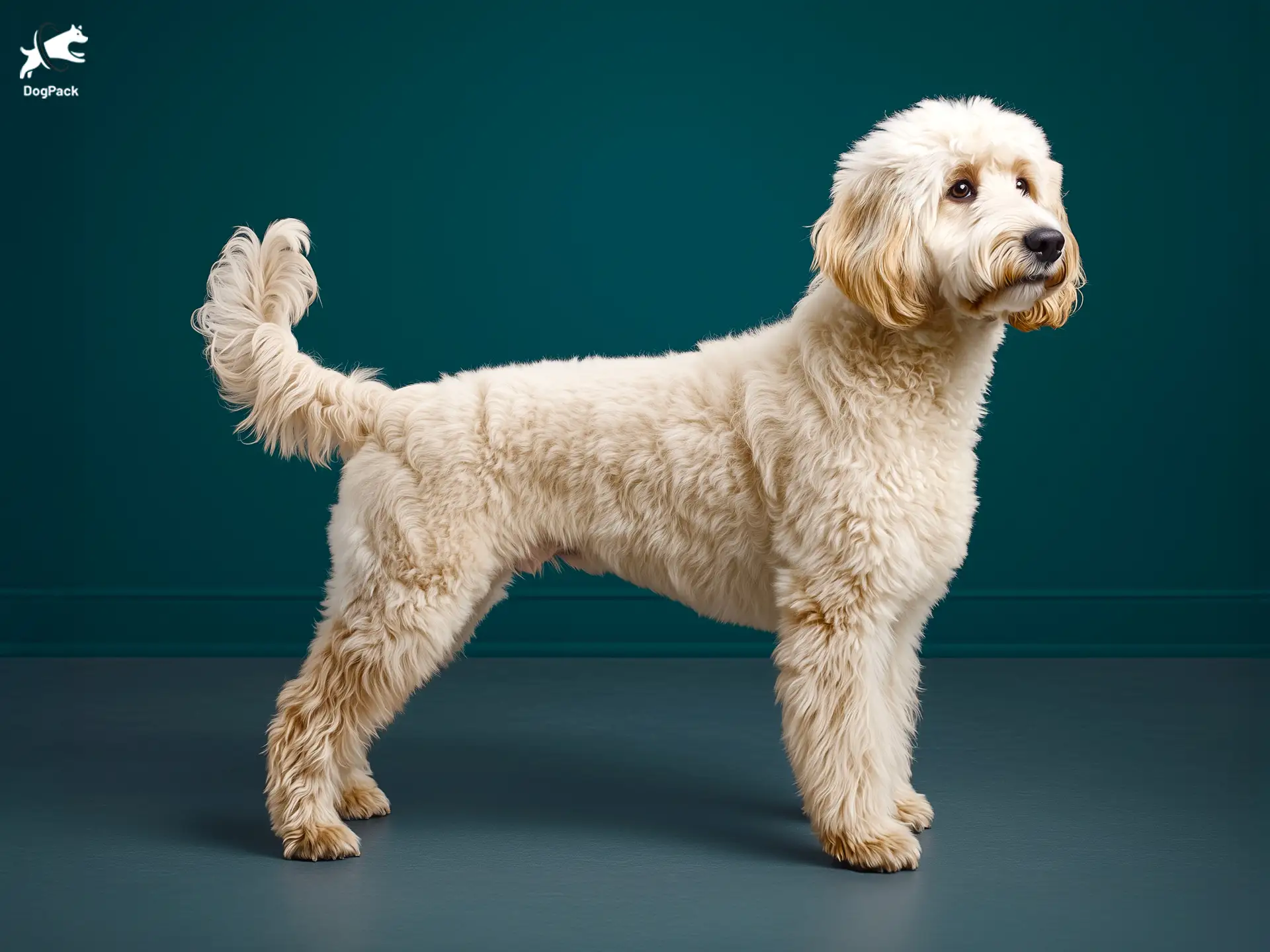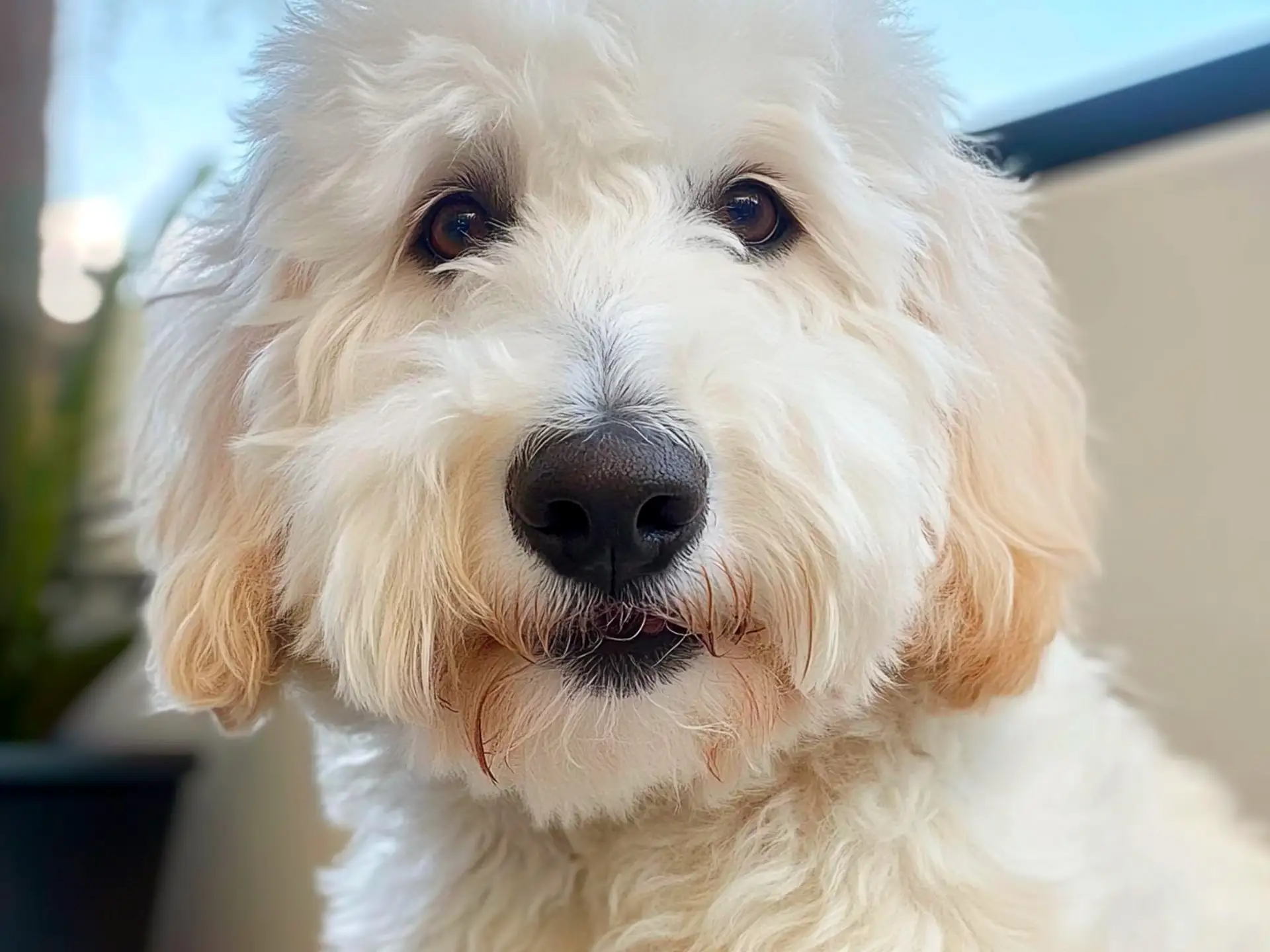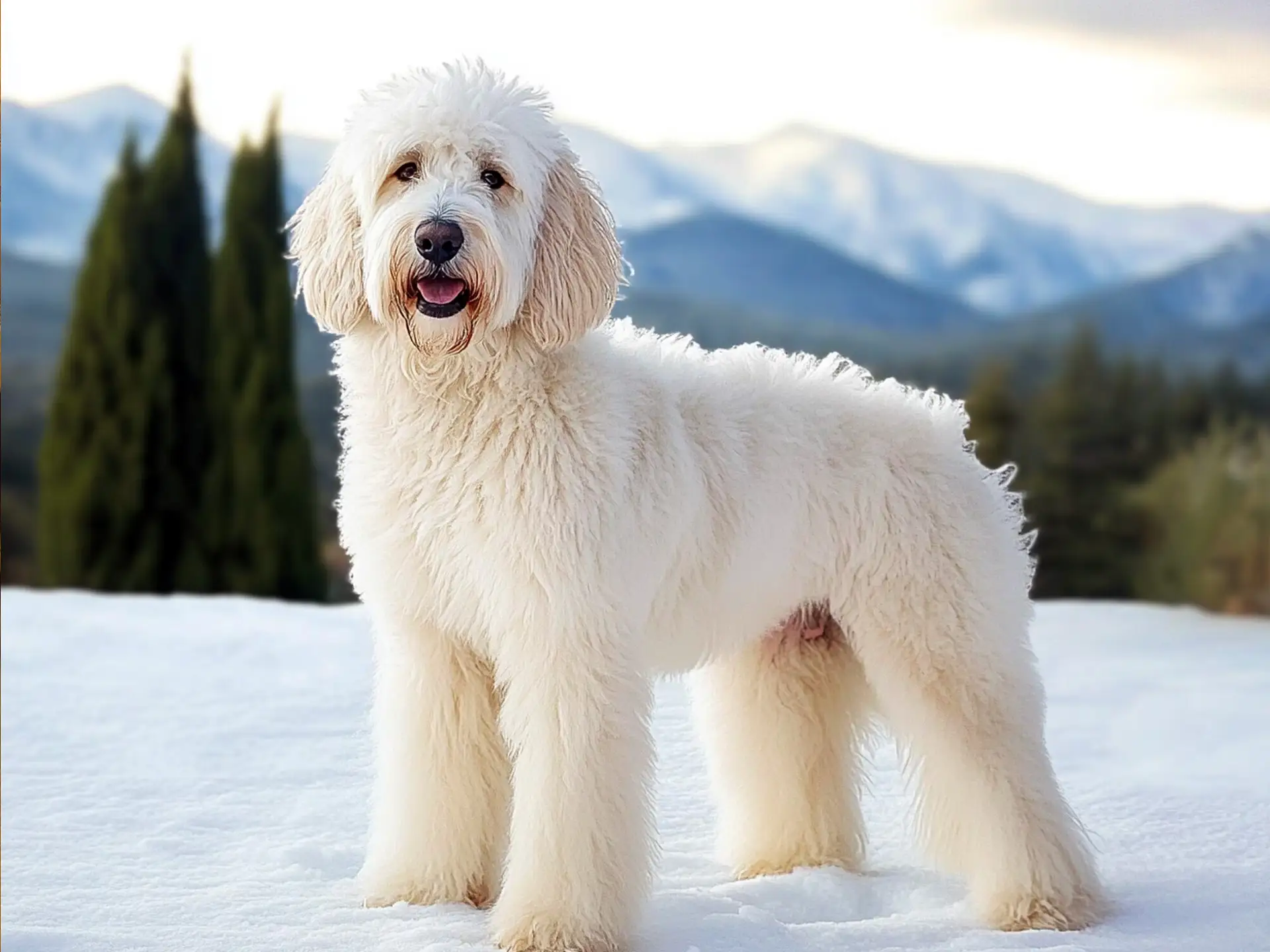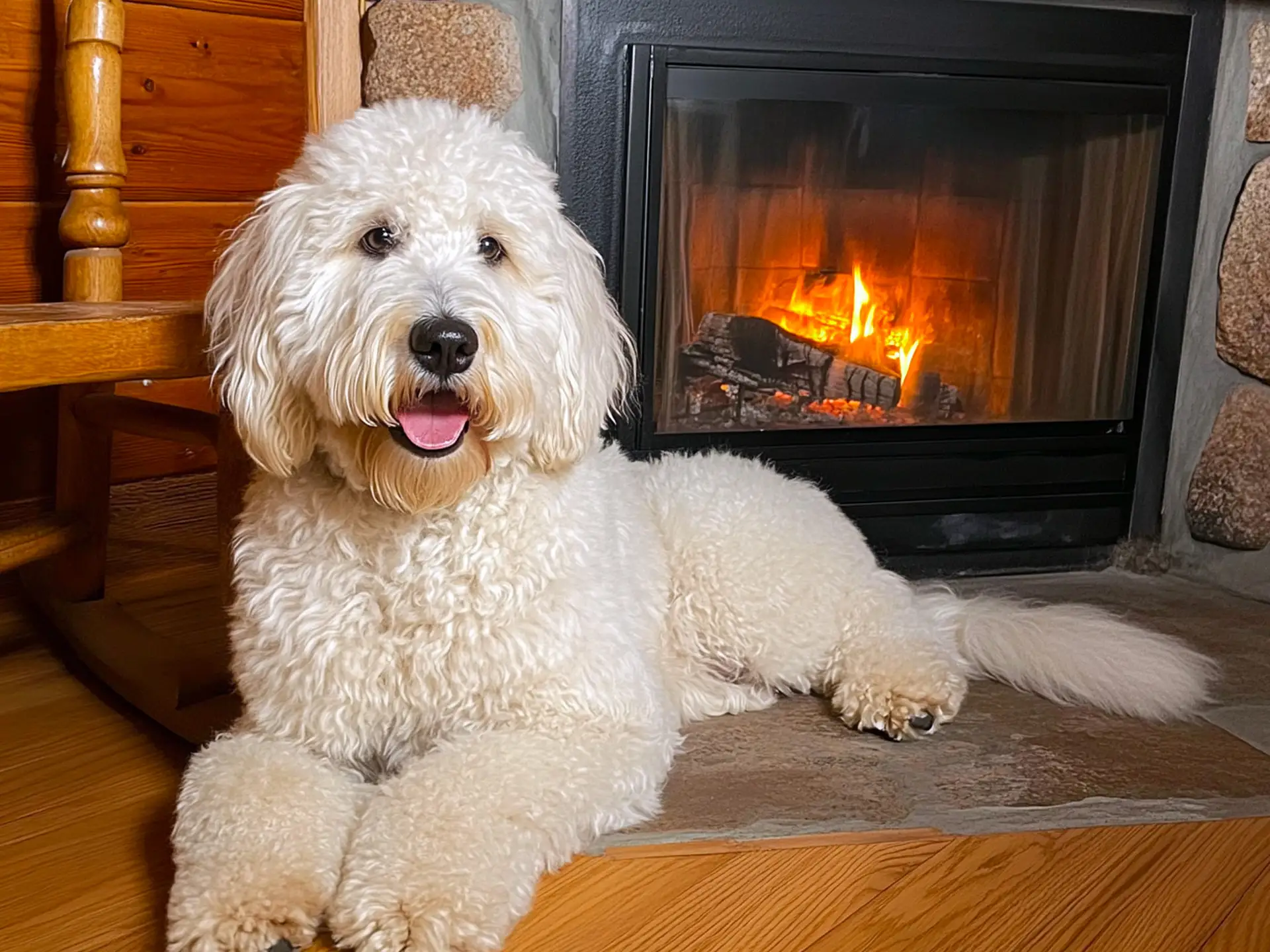Pyredoodle Dog Breed Info & Overview
The Pyredoodle is a hybrid breed that blends the protective instincts of the Great Pyrenees with the intelligence and low-shedding coat of the Standard Poodle. Known for their gentle demeanor and strong bond with their families, these large, affectionate dogs thrive in homes that offer plenty of space and companionship. With proper training and socialization, they make loyal and intuitive companions.
Characteristics
Pictures
Breed History
The Pyredoodle is a relatively recent hybrid, first gaining popularity in the early 2000s. Breeders sought to combine the Great Pyrenees’ strong guardian instincts with the Poodle’s intelligence and hypoallergenic coat. This blend aimed to create a protective yet affectionate family dog that sheds less and adapts well to modern living.
Although their formal breeding history is recent, some experts believe similar crossbreeds existed long before the designer dog trend took off. Farmers likely mixed these breeds to develop a working dog capable of both guarding livestock and serving as a loyal companion. Their protective nature and adaptability made them valuable assets on rural properties.
Today, the Pyredoodle continues to gain popularity, though they remain less common than other doodle hybrids. Their loyal temperament, striking appearance, and well-balanced personality make them a desirable choice for families seeking a large, affectionate companion with a guardian’s heart and a gentle demeanor.
Temperament, Personality
Pyredoodles are a unique mix of gentle companionship and natural protectiveness. While they are deeply affectionate with their families, they maintain the Great Pyrenees’ instinct to watch over their loved ones. This makes them excellent watchdogs who are wary of strangers yet loving with those they trust.
Their patient and calm nature allows them to get along well with children and other pets. They form strong bonds with their families and prefer to stay close rather than be left alone for long periods. However, socialization from an early age is crucial to prevent excessive wariness toward unfamiliar people or animals.
Despite their large size, they often display a playful and goofy side, bringing joy to their households. Pyredoodles enjoy interactive play, belly rubs, and even attempting to be lap dogs, despite their weight. Their combination of protective instincts and affectionate nature makes them both entertaining and reliable family companions.
Physical Characteristics
The Pyredoodle is a large, well-built dog with an impressive, noble presence. They typically stand between 22–32 inches tall and weigh anywhere from 75–100 pounds, inheriting their size from the Great Pyrenees parent. Their solid build gives them a strong yet elegant appearance.
Their coats vary depending on genetics, with some dogs displaying the Poodle’s wavy, low-shedding curls, while others inherit the thicker, double coat of the Great Pyrenees. Coat colors commonly include white, cream, tan, and occasional black markings. Their thick fur helps protect them from the elements but also requires regular grooming.
One of their most striking features is their deep, soulful eyes, which reflect intelligence and warmth. Their ears may be floppy or slightly raised, depending on which parent they take after. Whether their coat is wavy or straight, the Pyredoodle maintains a majestic, eye-catching presence.
Health Issues
Like most large breeds, Pyredoodles are prone to hip dysplasia, which can cause mobility issues over time. A healthy diet, controlled exercise, and joint supplements can help minimize the risk and maintain their long-term comfort.
Bloat (gastric torsion) is another significant concern, as deep-chested breeds are more susceptible. Feeding them smaller meals throughout the day and avoiding exercise right after eating can help reduce this risk. Regular vet checkups can also help detect early signs of digestive issues.
Some Pyredoodles inherit skin sensitivities, especially if they have the Poodle’s curlier coat, which can trap moisture and lead to irritation. Regular grooming and careful monitoring for hot spots or allergies will keep their skin healthy and free of discomfort.
Grooming Needs
Grooming requirements for Pyredoodles depend largely on their coat type. Those with curlier coats require brushing at least three times a week to prevent matting, while straighter coats need frequent brushing to control shedding. Regardless of coat texture, regular maintenance is necessary.
A professional grooming session every 8–12 weeks helps keep their coat manageable and clean. Trimming around their paws and sanitary areas also ensures their comfort and hygiene. Their nails should be clipped regularly to prevent overgrowth and discomfort.
Ear care is especially important, as Pyredoodles can be prone to wax buildup and infections. Cleaning their ears with a vet-approved solution helps prevent irritation. Brushing their teeth several times a week also supports dental health and fresh breath.
Exercise Requirements
Pyredoodles require moderate daily exercise to stay physically and mentally fit. They enjoy long walks, hikes, and interactive play sessions. Around 60–90 minutes of exercise per day is ideal for keeping them in good health without overworking their joints.
While they are not the most high-energy dogs, they still need a routine to prevent boredom. Due to their size, intense running or jumping isn’t always ideal, but steady activities like swimming or leisurely hikes suit them well. Having a fenced yard allows them to explore safely while tapping into their natural guardian instincts.
Mental stimulation is just as essential as physical exercise. Puzzle toys, obedience training, and scent games engage their intelligence, keeping them from developing destructive habits. A well-exercised Pyredoodle is a happy, well-mannered companion.
Training Tips
Training a Pyredoodle requires patience, consistency, and positive reinforcement. They are intelligent but can be independent thinkers, especially when their Great Pyrenees lineage influences their behavior. Establishing clear leadership from puppyhood helps prevent stubbornness.
Using treats, praise, and rewards works best when training them. Harsh methods can make them resistant, so a firm but kind approach is key. Short, engaging training sessions are more effective than long, repetitive drills.
Early socialization is critical to ensuring they grow into well-adjusted dogs. Exposing them to various environments, people, and other animals helps them become more confident and less wary in new situations. A well-trained Pyredoodle is a joy to have as a family companion.
Nutrition, Diet
A high-quality diet is crucial for maintaining the health of a Pyredoodle. They do best on protein-rich dog food with at least 25% protein content, sourced from real meat like chicken, beef, or fish. This supports muscle maintenance and overall well-being.
Most adult Pyredoodles thrive on 3–3.5 cups of food per day, split into two meals. Portion control is important to prevent obesity, as excess weight can lead to joint problems. Monitoring their caloric intake and adjusting portions based on activity levels is essential.
Adding joint-friendly supplements like glucosamine and omega-3 fatty acids can promote mobility and coat health. Hydration is equally important, so always provide access to fresh, clean water, especially after exercise.
Adoption, Breeders
Adopting a Pyredoodle can be a rewarding choice, but it may take patience to find one in a rescue. Checking with Great Pyrenees and Poodle-specific rescues can increase your chances. Engaging with owner communities, like Pyredoodle Lovers Facebook Group, may also provide leads on available dogs and firsthand experiences from owners.
If purchasing from a breeder, ensure they conduct thorough health testing on both parents. Responsible breeders screen for conditions like hip and elbow dysplasia, heart disease, and genetic disorders common in both parent breeds. A good breeder will also welcome visits, answer questions, and provide detailed health records.
Avoid backyard breeders or online listings from sellers who cannot prove ethical breeding practices. Be cautious of breeders advertising “mini” Pyredoodles, as this is a naturally large breed. Researching thoroughly ensures a healthy, well-socialized dog that will be a lifelong companion.
Family Pet?
For families looking for a loving yet protective dog, the Pyredoodle is an excellent choice. They are gentle with children and thrive in homes that include them in daily activities. Their calm nature makes them a good fit for both active and relaxed households.
Pyredoodles tend to get along well with other pets, particularly if raised with them from a young age. Early introductions are important to ensure a harmonious relationship, as their guardian instincts may make them cautious of unfamiliar animals.
Their affectionate side means they love being close to their humans. Whether lounging on the couch or keeping an eye on the backyard, Pyredoodles enjoy companionship. They do best with owners who appreciate their protective yet gentle demeanor.
Right For You?
A Pyredoodle thrives in homes where they have space to move and a family that provides daily exercise and mental stimulation. While they adapt well to various living situations, they may struggle in small apartments without regular outdoor time.
They require owners who are committed to training and socialization. While naturally well-mannered, they need consistent guidance to ensure their protective instincts don’t turn into excessive wariness or stubbornness. A structured routine benefits both their mental and physical well-being.
For those seeking a large, intelligent, and affectionate companion with strong loyalty, the Pyredoodle is a fantastic choice. With proper care, training, and affection, they become loving, devoted family members who provide years of companionship and protection.
Conclusion
The Pyredoodle offers a warm blend of guardian instincts and sweet companionship, capturing the hearts of those who appreciate a laid-back yet protective family dog. Part fluffy sentinel, part devoted cuddle-bug, this hybrid can adapt beautifully to households that provide love, socialization, and consistent care.
Whether you’re drawn to their keen intelligence or that calming presence, the Pyredoodle often delivers a lifetime of loyalty and gentle support. If you’re ready for a friendly giant who’ll watch over your loved ones, they might just be your perfect match.
FAQs
-
Do Pyredoodles retain the Great Pyrenees’ guarding instincts?
Yes! While Pyredoodles are affectionate and social, they often retain the protective instincts of the Great Pyrenees. They may be wary of strangers but are usually less independent than a purebred Pyrenees, thanks to the Poodle’s people-focused nature.
-
Is a Pyredoodle more hypoallergenic than a Great Pyrenees?
A Pyredoodle may inherit the Poodle’s low-shedding coat, making them more allergy-friendly than a Great Pyrenees. However, coat type varies—some have wavy, low-shedding fur, while others may have a thicker, slightly shedding coat.
-
Can a Pyredoodle thrive in warm climates?
The Pyredoodle’s coat is designed for insulation, meaning they do better in cooler climates. In warmer areas, they need plenty of shade, water, and controlled outdoor time to prevent overheating. Regular grooming helps avoid matting, which can trap heat.
-
Are Pyredoodles easier to train than Great Pyrenees?
Yes! The Poodle’s intelligence makes the Pyredoodle generally more trainable than a purebred Great Pyrenees, which can be independent. They respond well to positive reinforcement training but may still have a stubborn streak that requires consistency.
-
Do Pyredoodles require less exercise than a Standard Poodle?
Yes! While Poodles are highly active, Pyredoodles are usually moderate-energy dogs. They enjoy daily walks and playtime but don’t require intense exercise like a Poodle. A 60-minute mix of mental and physical stimulation keeps them happy.
Breed Ratings
The Pyredoodle is quick-witted thanks to Poodle genes, but can be independent.
They enjoy fun but balance it with a calm demeanor.
Moderate bursts of activity suit them well, though they aren’t hyper.
Often lower shedding than a pure Pyrenees, but not always fully hypoallergenic.
Generally low, but can vary depending on lineage and socialization.
Curlier coats require regular brushing and occasional trims.
Smart but sometimes willful, respond best to firm, positive methods.
They can manage some alone time, but thrive on family interaction.
Will alert you to potential threats but usually not incessant barkers.
Not typically heavy droolers, though some may inherit Pyrenees traits.
Often sociable if socialized early and introduced properly.
Fairly robust, though vigilance for joint and bloat issues is key.

















